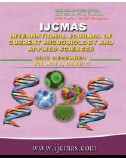


 National Academy of Agricultural Sciences (NAAS)
National Academy of Agricultural Sciences (NAAS)

|
PRINT ISSN : 2319-7692
Online ISSN : 2319-7706 Issues : 12 per year Publisher : Excellent Publishers Email : editorijcmas@gmail.com / submit@ijcmas.com Editor-in-chief: Dr.M.Prakash Index Copernicus ICV 2018: 95.39 NAAS RATING 2020: 5.38 |
Paper and pulp mills discharge large volumes of wastewater into the environment. Crop productivity can be improved by using this wastewater, which is rich in salts and nutrients, as an irrigation source improves crop productivity by supplying enormous amount of nutrients. But for a long termit leads to development of soil salinity and sodicity and also calcareousness. Since leaching of salt affected soils with good quality water is impossible because of its non-availability in the study area, an attempt was made in the present study with the technique of phytodesalinisation using halophytes for remediation. Sesuvium portulacastrum, a facultative halophyte is widely studied for its phyto-desalinisation capacity of salt affected soils. Hence, present work was carried out to evaluate the S. portulacastrum for desalinization of saline-sodic soils of long term treated paper mill effluent irrigating soils. The halophyte found to have maximum sodium absorption and reduced the soil salinity considerably with 56.8 per cent reduction in ECe of the soil. A pot experiment was conducted in the long term treated effluent irrigating soils using good quality irrigation water and treated effluent as a source of irrigation. The cultivation of S. portulacastrum under treated effluent irrigating soils showed significant absorption of sodium ions and their accumulation in the shoot portion with the leaves having the highest Na and Cl content. Physiological, anatomical and biochemical studies showed the tolerance potential of S. portulacastrum to salt stress by accumulating osmolytes. Thus S. portulacastrum may possibly an ideal candidate for reclamation of salinity induced by treated paper mill effluent irrigation.
 |
 |
 |
 |
 |